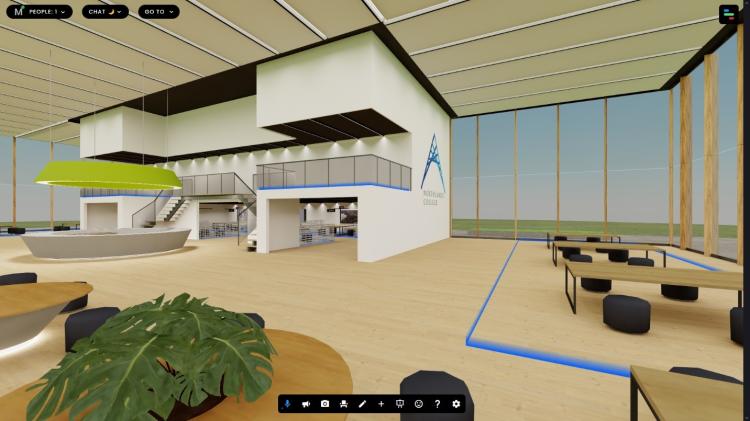Karsten Henriksen, Northlands College President and CEO, Provides the Potential of Digital Platforms in Education and Illustrates the Power of the Metaverse
In the realm of higher education, Northlands College sees a new horizon emerging as attitudes toward the metaverse, and artificial intelligence (AI) undergo a profound transformation. The metaverse, with its intuitive interface, is gaining favor among learners and educators alike for its potential to revolutionize teaching and learning. AI, on the other hand, has evolved into a powerful tool for personalized learning, offering tailored content to meet the individual needs of both students and learners. Together, these technologies are reshaping traditional teaching methods, offering immersive experiences, and fostering global connectivity. This visionary outlook is redefining the way higher education perceives and creates learning spaces for the future.

Northlands College is among the pioneering institutions in Canada to embrace the metaverse, creating a virtual campus that transcends physical boundaries. This immersive learning experience was conceived as a dynamic platform to redefine knowledge acquisition and experiential learning. Today, the metaverse is more than just a technological innovation; it is a revolutionary platform that promotes inclusivity in learning and eliminates geographical barriers. Karsten Henriksen, President and CEO of Northlands College, emphasizes the potential of digital platforms in education, stating, "Knowledge knows no bounds in the Metaverse. It's an inclusive classroom without borders, offering a global community of learners the opportunity to collaborate and interact across cultures. Regardless of where they are, learners can engage in shared experiences, breaking down barriers and expanding educational horizons."
Engaging in immersive metaverse learning offers learners and educators comparable advantages without the necessity for physical presence. This implies that equivalent learning outcomes can be attained regardless of the time or less-than-ideal conditions, eliminating the need for direct observation or travel. In certain instances, the immersive learning encounters facilitated by the metaverse have the potential to deliver comparable benefits to experiential learning. The metaverse's immersive learning opportunities have revolutionized pedagogical and technical support in education, significantly enhancing student motivation. The Metaverse offers learners immersive experiences that promote teamwork and skill development, engaging them in various ways in the classroom. These experiences incorporate virtual technologies like Virtual Reality (VR), Multi-User Virtual Environment (MUVE), Mixed Reality (MR), and Augmented Reality (AR) to create immersion and act as gateways, enabling users to immerse themselves in Metaverse environments, emphasizing the importance of multimodal immersion.
Complementing the metaverse, Northlands College sees AI as playing a pivotal role in personalizing learning journeys. By recognizing the unique learning profiles of each student, AI algorithms analyze learning patterns and adapt educational content to ensure individualized progress. This approach enhances comprehension and retention, empowering learners to navigate their educational paths at their own pace. Many higher education institutions struggle with issues like student disengagement and high dropout rates, largely due to the limitations of traditional teaching methods that don't cater to individual needs. By harnessing the power of big data analytics and AI, colleges and universities can develop personalized learning experiences that adapt to each learner's unique abilities and requirements. This personalized approach has the potential to boost motivation, lower dropout rates, and offer educators valuable insights into their learners/students' learning processes. AI-driven systems can analyze how people learn, their skills, and their progress, allowing instructors to tailor their teaching methods accordingly. For instance, AI has the power to pinpoint those who require extra assistance or those who need more challenging material. By addressing these needs proactively, educational institutions like Northlands College can help learners maximize their potential and reduce the risk of dropping out.
A recent illustration of this occurred at Ivy Tech, where the community college devised a distinctive algorithm to identify learners who were statistically unlikely to pass their classes or graduate. In one Google cloud project, there were algorithms that could predict a learner's final grade in a course with 60%-70% accuracy by week two of the semester. The outcome? A total of 3,000 learners received the necessary intervention to successfully complete their courses. In addition to developing and customizing AI to the needs of learners, AI presents institutions and organizations tools to enable the identification of learning needs "just in time" allowing for tailored curriculum developed to the needs of industry thereby, increasing responsiveness to employee/client needs and increasing competitiveness in the marketplace. Rather than the traditional models of curriculum design which, in higher education can take a week or, months, AI incorporated with deep learning can accomplish these goals in minutes or, hours while, also saving money.
As Northlands College ventures into the intersection of educational technologies, the college's President and CEO Karsten Henriksen brings a forward-thinking approach. One of the most critical issues to consider is how educational institutions can effectively ready learners for the rapidly evolving technology-driven world, including the disruptive technologies that will reshape the future of work. By harnessing the potential of the metaverse and AI, Northlands College has created dynamic and inclusive learning environments that cater to the diverse needs of its learners. This visionary outlook will not only redefine traditional teaching methods but also pave the way for a more accessible and equitable education system for all.
The Metaverse is not a far-off concept; it's already here, according to Northlands College. Educational institutions that begin their transformation journey now will be ready to meet the needs of Generation-Z and Generation-Alpha students. By adopting quantum computing, AI, immersive learning environments, and promoting collaboration, higher education can adapt to the demands of the digital age. This transformation will lead to more flexible, accessible, and engaging educational experiences, equipping students to excel in the Metaverse and beyond. The future of education has arrived, and universities must embrace the Metaverse now.













